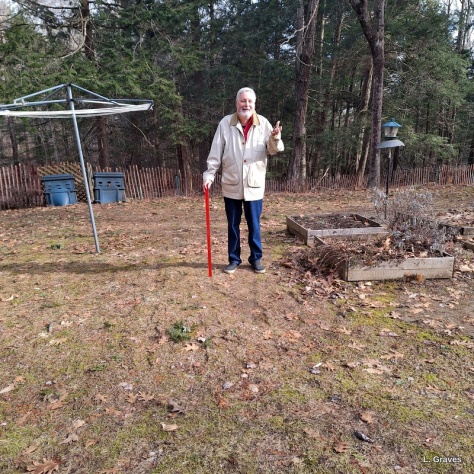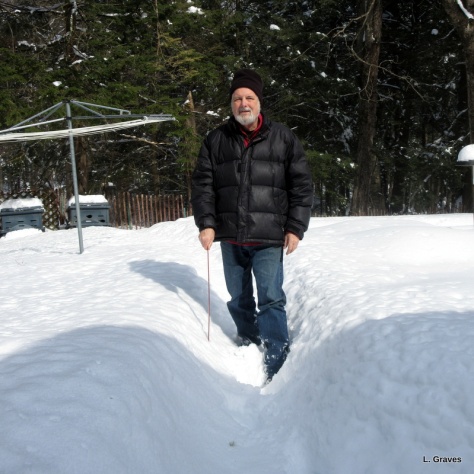The title of this post tells it all. Today, March 11, our yard is officially free of snow, and there is nothing for Snow-Gauge Clif to measure. In the past, we would hope to be snow free by our youngest daughter’s birthday on April 22. Some years we were. Other years, we weren’t. This year, we are way ahead of April 22.
First, the front yard, with Snow-Gauge Clif,
and a broader view to chronicle our snow-free yard.
To the backyard.
Therefore, unless we get some snow in March—and we could—it is time to say au revoir to Snow-Gauge Clif who was only with us for two weeks this year. What the heck! Can this really be happening in Maine? A snow-free yard in mid-March? It seems that it is.
Onward to yard work, usually an April chore.
*******************************************************************
Reading
Crewe Train by Rose Macaulay
Published in 1926
The story of a girl—who doesn’t like to read, doesn’t like art, doesn’t like theater, and is what we Franco-Americans would call lazy—is not a natural fit for me. And so it was with Denham Dobie, the protagonist in Crewe Train. My initial take on Denham was that she was a boring lump of a young woman, and I almost stopped reading the book after the first twenty pages.
But then something unexpected happened—Rose Macaulay’s writing and her sympathy for this unsociable, unambitious character won me over. By the end, I was as worried about Denham as I would be if she were a member of my own family. Well, all right. Maybe I’m overstating the case. Still, I brooded about Denham.
When the book opens, Denham is living in relative freedom with her father, also unsociable, in Andorra, a small country between Spain and France. When Denham’s father dies, Denham’s aunt—her mother’s sister—takes her back to England in the hopes of training her to be a proper young lady. But this is no Pygmalion story, and Denham is no Audrey Hepburn.
Initially, Denham does try to please her fashion-conscious aunt. She falls in love with and marries a kind but conventional man named Arnold, who likes to mess about in boats and play games with Denham. But Arnold also likes London and books—he works as a publisher—and plays and dinner parties. He likes being around people, and Denham does not. For her small talk is a misery, and she would much rather be rambling around outside.
Denham and Arnold are an odd, uneasy couple, and I wound up feeling sorry for both of them as they tried to accommodate each other’s opposing tastes.
I won’t reveal the ending except to note that the casual cruelty of Denham’s aunt sets in motion an unhappy chain of events. Crewe Train, while not a tragedy, is a sad book despite its flashes of humor.
One more thing to note: Crewe Train was published in 1926, and in my experience, writers of that time frequently included racist words and descriptions in their books. So it is with Crewe Train. Not the worst I’ve read—that honor goes to the otherwise delightful Miss Pettigrew Lives for a Day—but not good all the same.
Nevertheless, Crewe Train is a book worth reading. Denham, for all her flaws, feels like a woman ahead her time, flailing as she tries to live on her own terms, unencumbered by possessions, free to wander the countryside, unconcerned with domestic duties.
All Denham wants is a simple life, not so easy for women of her class and generation in the 1920s.























































